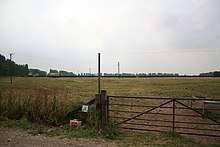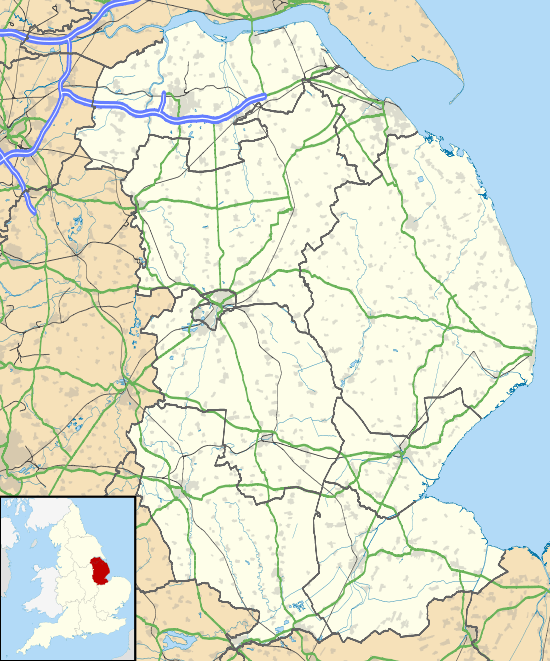Coates medieval settlement
Coates medieval settlement is a deserted medieval village in Lincolnshire, England. It is in the hamlet of Coates-by-Stow, about 2 miles (3.2 km) east of the village of Stow. It is a Scheduled Monument.[1]
| Coates medieval settlement | |
|---|---|
 The site of the village, in a field north of the road near Grange Farm | |
| Location | Lincolnshire grid reference SK 911 834 |
| Coordinates | 53°20′23″N 0°37′58″W |
| Designated | 24 November 1999 |
| Reference no. | 1016979 |
 Location of Coates medieval settlement in Lincolnshire | |
History
The village of Coates was recorded in the Domesday Book of 1086, having then six households. In the late 12th century, the church and land of the village were given to Welbeck Abbey in Nottinghamshire. The population of the village had increased by the early 14th century, but later in the century was reduced by the Black Death, and did not recover.[1]
Earthworks
Today at Coates-by-Stow there are two farms, a hall, several cottages and the Grade I listed Church of St Edith.[2][3] Medieval ridge and furrow cultivation is discernable in the field immediately west of Grange Farm. In the adjoining field to the west are the earthworks of the village. There is a west–east roadway, shown by a ditch of length 430 metres (1,410 ft) and about 0.7 metres (2 ft 4 in) deep; on both sides of this are rectangular ditched enclosures, where houses and outbuildings once stood. North of the northern range of buildings are indications of large rectangular enclosures, thought to have been medieval paddocks; inside these can be seen the ridge and furrow pattern of earlier cultivation in that area.[1][3]
Further to the west, at grid reference SK 908 831, there is an L-shaped water-filled depression about 30 metres (98 ft) west of the church, evidently the remaining part of a moat. It is thought that there was a group of buildings within the moat, extending over an area where Coates Hall and Hall Farm now stand. The site may have been a grange of Welbeck Abbey, established in the late 12th century, of which only the church, whose oldest parts date from that time, survives.[1][3]
See also
- List of lost settlements in the UK
References
- Historic England. "Coates medieval settlement and moated site (1016979)". National Heritage List for England. Retrieved 12 February 2020.
- Historic England. "Church of St Edith (1146742)". National Heritage List for England. Retrieved 12 February 2020.
- Historic England. "Coates (326909)". PastScape. Retrieved 12 February 2020.